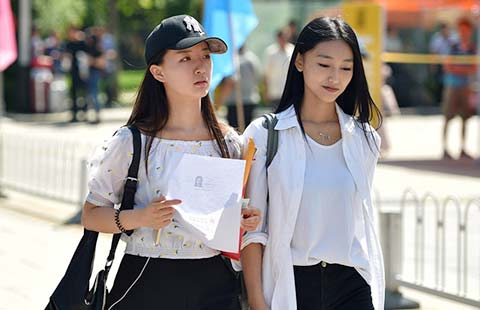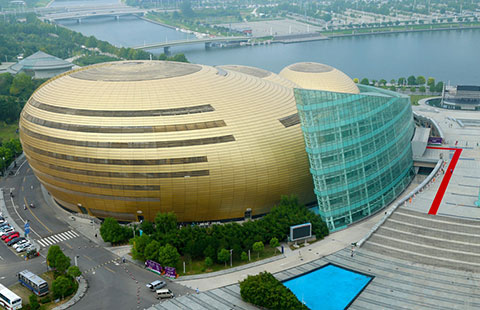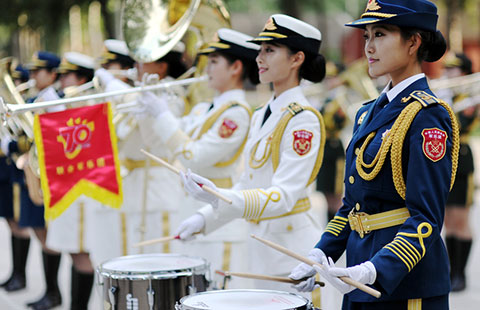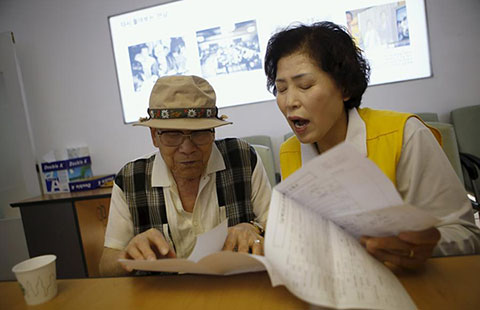

|
Heinrich Hiesinger, chairman of the executive board, ThyssenKrupp AG, gives a speech at the fifth Multinational Corporations Leaders' Roundtable. |
Editor's note: The fifth Multinational Corporations Leaders' Roundtable was held in Beijing on June 22 and 23 with the theme of "Promote Multinational Corporations' Investment, Strengthen Corporate Social Responsibility and Facilitate Sustainable Development". Participants share their views on the high-level conference:
Li Yizhong, vice-chairman of the Subcommittee for Economic Affairs at the CPPCC and former minister of Industry and Information Technology
As the world has entered an era of profound changes, the internal and external environment of China's foreign trade faces changes too. It is difficult to continue the traditional mode that propels export growth. Adjustment and transition in the growth mode of foreign trade are imminent. I put forward the following suggestions to Chinese enterprises: improve the industry chain; broaden sales channels; promote e-commerce; explore international markets; enhance awareness on social responsibilities.
Gao Hucheng, international trade negotiation representative and vice-minister, Ministry of Commerce
In recent years, along with its own development and rising national strength, China has actively implemented a "go-out" strategy, encouraging its enterprises to enter international markets. Chinese enterprises have become a mainstay in global investment and cooperation. This in turn brings new opportunities and broad prospects for investment cooperation between China and foreign countries. Statistics indicate that at the end of 2011 overseas direct investments from China totaled $380 billion. With overseas assets approaching $1.6 trillion, Chinese overseas investment is now in 178 countries and involves 18,000 Chinese enterprises.
Quan Zhezhu, vice-minister, United Front Work Department of the CCCPC
China's private enterprises now have a strong desire to go to international markets and the time is ripe. At the same time, they should be fully aware of the risks ahead to better cope with potential risks in international markets, which are increasingly complex and full of uncertainties. Back at home, the Chinese economy is facing many obscure problems and its growth will slow. Chinese enterprises should contemplate all these factors before setting foot in international markets.
Heinrich Hiesinger, chairman of the executive board, ThyssenKrupp AG
To realize our goals in energy and environmental protection, governments and enterprises must carry out effective cooperation. This is the case in both Germany and China. I believe the European Union and China should enhance bilateral cooperation and tap the potential in this regard. One thing is very important: Foreign enterprises should be treated as equals before the law in China and granted with an equitable environment for competition.
Zhou Zhongshu, president, China Minmetals Corporation
Many Chinese enterprises have stepped up efforts to merge or purchase advanced technologies and name brands overseas. But the comprehensive strength of a company's brand will not necessarily be upgraded simply with the technologies purchased. This is because the competitive edge of a first-class conglomerate is propelled by an integrated management system and its continuous R&D capability. Such core capability cannot be acquired through a single purchase or merger. Chinese enterprises should continue to temper themselves at home and build themselves stronger to fare better in competition in international markets.
Wang Yusuo, chairman of the board, ENN group
Last June I had a long talk with the governor of the state of Nevada in the United States. When I was asked for proposals based on China's experience in economic development, my answers were two words only: opening up. It is known to all that thanks to reform and opening-up policies, China has sustained fast growth for many years. Under the current adverse world economic situation, countries in the world should actively promote free trade and investment with an open mind and combat protectionism in all forms.
Li Xiaohua, chairman, Huada International Holding Group
As a businessman that has grown up along with China's reform and opening-up policy, our generation is lucky as we jumped on the good opportunity. I deeply feel that the best way to achieve development is for Chinese enterprises to go to international markets and introduce foreign companies to do business in China. A nation that is willing to open up is a great nation. It will have the strength to march forward too. Wish our friends in the business sector even greater success in their course to embrace the world.
Steve Orlins, president, National Committee on US-China Relations
Chinese investment in the US boosts economic growth and creates American jobs, one of the most important issues for Americans today, especially in this election year.
Municipal and state leaders are hungry for investment, and Chinese companies should go directly to these state and local leaders. This will help Chinese companies expand their global brand recognition while simultaneously bolstering the American economy and improving relations. But this openness must be a two-way street. Let us work together to make sure the door remains open on both sides of the Pacific so they can help build constructive relations between these two great nations.
Christophe Bahuet, country director, the UNDP in China
The United Nations Development Program realizes the importance of enterprises' social responsibilities and promotes that in our programs. For example, the United Nations Global Compact aims to improve social responsibilities of the governments and enterprises. We notice that China has made great progress in this field. The Chinese government has urged enterprises to take more on social responsibilities.
Du Keping, vice-president, Sinochem Group
Sinochem's overseas projects are mainly located in Africa, South America and the Middle East. In the light of mutual benefits and win-win cooperation, Sinochem has made efforts to promote localization. At the same time, the group tries to improve social development of the regions where the projects are located through localization of employees and purchasing, as well as providing aid to medical treatment, education and construction of infrastructure. We also highly emphasize harmonious coexistence between humans and the natural environment.
Sean Maloney, executive vice president, Intel Corporation
At Intel, social responsibilities mean we need to create common values together with the entire society, which include technological innovation, cooperative innovation and social innovation. These three innovations are three core values of Intel's social responsibilities. We grow with China and we think the future of China depends on whether it can generate the next generation of innovators.
Our educational programs benefit 1.9 million teachers and 200 million students in China. More than 65 percent of our 9,000 employees in China participate in community and social service every year. It's our honor to participate in China's economic growth.
Jeffery Moon, vice-president, Cisco Systems Inc.
We have our own strategies to develop responsible enterprise operation and improve sustainable development. We combine our social responsibility programs with our global development strategy. And we cooperate with communication companies to enhance rewards to the community in innovative ways.
We develop innovative projects to accelerate economic growth and meet human needs, especially in medical treatment and education. Five thousand employees at Intel have participated in these social responsibility programs since 1995. It not only makes better use of various resources but also boosts their morale. They are always willing to take social responsibilities.
Michael Jiang, global vice-president, Motorola Solutions, Inc.
As one of the first transnational corporations in China, we are glad to share a piece of good news with you: This year marks the 25th anniversary of Motorola in China. in addition to adhering to our China strategy, being a good citizen in Chinese society is also an important part of development at Motorola in China. We'd love to work together with other enterprise, make more contributions to build an harmonious society and achieve sustainable development in China.
Ian Chang, global vice-president, Boeing Co
We encourage scientific research including scientific and technological research projects in Chinese universities.
We commit ourselves to enhancing learning with high quality, including education research in fields of mathematics, technology and environment protection. We cooperate with 450 schools in Beijing and Xi'an. Through a series of projects at different levels, Boeing is trying to shoulder our social responsibilities and strengthen innovation.
(China Daily 06/27/2012 page6)












